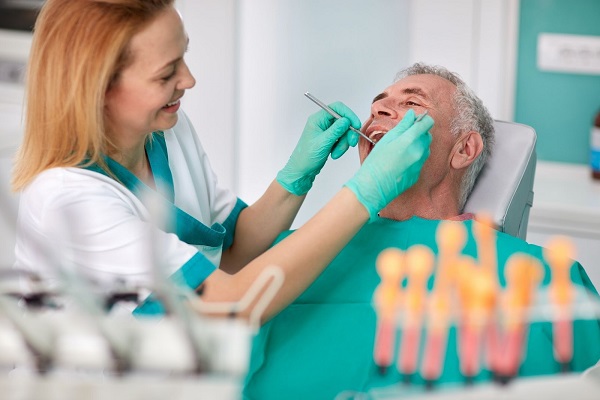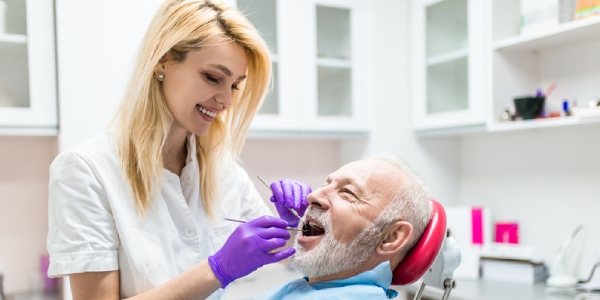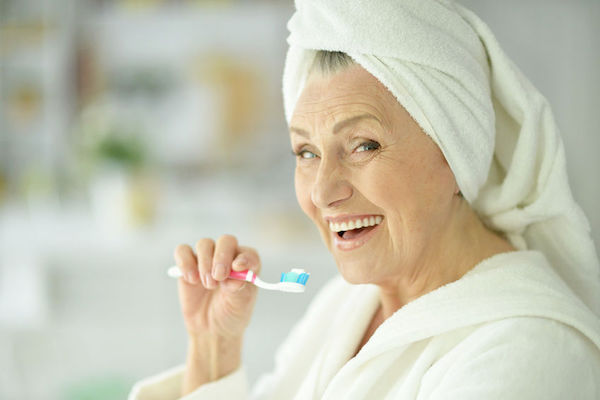Elderly Dental Care: A Crucial Aspect Of Good Physical Health
One of the most common things I’ve noticed over years of my dental practice is the neglect of oral hygiene of elderly patients. Dental care deserves as much importance as the rest of the body’s care when a person shows ageing signs. A routine dental checkup is as important as a master health checkup.
At 4 Squares Dentistry, we recommend all elderly patients to seek dental care at least twice a year. And that is only for patients with good oral health. If you are already facing long-standing dental issues, you should visit your dentist every couple of months. It is an absolute necessity because our dental concerns escalate as we age. Besides, it is a common misconception that all aged people are bound to become toothless. If you follow my guidelines, I can assure you of desirable dental health until you are a hundred years old.

Common dental problems faced by the elderly
Are you or your elderly loved ones at home facing any of the following dental issues?
- Dry mouth
Ageing itself is not a reason for a dry mouth. It occurs mostly due to increased intake of medication and chronic conditions. The presence of cavities, tooth decay and other oral issues can worsen the condition.
- Attrition
One of the most common dental problems for the aged is attrition or the wear and tear of teeth- an inevitable process that occurs after years of chewing and grinding. It eventually leads to loss of enamel, which becomes the main cause for cavities later.
- Tooth sensitivity
Your gums recede as you age, which is the most common reason for tooth sensitivity. Receding gums expose the areas of the tooth that are not protected by enamel. Tooth sensitivity is an issue that must not be ignored, as it can be a symptom of a more serious, underlying condition like cracked or fractured teeth.
- Gingivitis
Otherwise known as periodontal disease, it is another common age-related dental issue caused by the excess formation of plaque. It requires immediate attention, for periodontal destruction may be furthered by changes in the salivary glands’ secretion.
Common information collected during a dental checkup for senior citizens
Dealing with elderly patients requires an in-depth review of their previous oral history, which is why we dentists often ask for the following details:
- The date of their last dental visit.
- Occurrence of pain or discomfort in their mouth.
- Possibility of loose or cracked teeth.
- Difficulty in chewing, swallowing or tasting food.
- Presence of lumps or painful swellings in the oral cavity.
A normal dental checkup comprises the following examinations:
- Checking their bite.
- Examination of the inner cheeks.
- Checking for any swelling in the lymph nodes and the tongue.
- Examining the condition of the dentures.
Dental care tips for elderly citizens to avoid oral problems
Click Here – Taking care of your teeth in the later years of your life isn’t any different to what was done during the younger years. The cardinal rule is to prevent any oral health issues, and it takes nothing more than good oral care to ensure the same.
- Make dental visits a part of your routine life. Even if you do not have any oral health problems, visiting your dentist regularly allows you to detect potential issues on time.
- Brush twice a day and floss at least once every day.
- Avoid alcohol. Instead, drink plenty of water to prevent dry mouth and cracked lips.
- Say No to any form of tobacco-be it cigarettes or chewing tobacco. They not only deteriorate your dental health but are also one of the main reasons for oral cancer and other diseases like diabetes and hypertension.
- Use a toothpaste that contains fluoride.
- Use antibacterial mouthwash to reduce the buildup of plaque.
- Get your dentures checked regularly and change them when your dentist recommends them.
- Take an adequate amount of Calcium in your diet, and avoid eating foods rich in sugar.
- Do not delay your dental visits when there is pain or any oral issue.
Even if your elderly loved-ones are bed-ridden and home-bound, always ensure that their oral health is in prime condition. You can also ask your dentist to make a home visit and check on the dental health of older adults who cannot visit the clinic.


